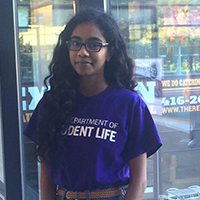Hania Jahangir
Major: Women and Gender Studies (WGS)
Minors: International Development Studies (IDS) & Critical Migration Studies (CMS)
What factors contributed to you choosing your program(s)?
Primarily, the courses required for each program were a major deciding factor when choosing my programs. As somebody who wanted to explore various disciplines instead of just one, programs like WGS, IDS and CMS offer a range of courses that really broaden your horizons. For instance, CMS is a program which offers sociology courses primarily, but also history, health studies, global asia studies, city studies, anthropology, political science and geography. This wide course selection which looks at multiple perspectives is what led me to choose CMS.
Can you describe your program(s)? What is it actually like?
My programs were theory and essay-based in the earlier years, but as a third-year student, I am now exploring research topics. What I love about them is that all my courses in all of my programs relate to my life and everyday events. Opportunities for discussions in classes really help with this. The things I learn help me to view life from various perspectives and not only grow as a student, but also as a person.
What tips/advice can you provide to students just starting or considering this program(s)?
I would advise that students take programs and courses that interest them. Of course there will be a couple courses that will be required and are not necessarily your favourite, but it is about the bigger picture. Also, the more you relate with a topic, the better you tend to do in your classes. Lastly, remember to roughly plan out your courses as some may overlap between programs, which can makes it easier for you to decide your combination of programs.
What will you do with your degree after graduation? (Future plans?)
I plan on applying for law school and potentially a joint Masters in social justice. One day, I hope to use all these skills to help reform the United Nations.
What has your academic journey during your time been like as you progress toward graduation?
In first year, it is about learning the basics. You learn the theories and start to develop your own ideas. Second year takes this further as you go more in-depth and often have class discussions to develop how these ideas are relevant. Third and fourth year then take the knowledge you have acquired a step further. While you are still discussing and learning new theories, you are now working towards conducting your own research. Whether it is community-based or within the class depends on the course.

Meena Sivaneswaralingam
Major: Human Geography
Minors: Critical Migration Studies & Public Law
What factors contributed to you choosing your program(s)?
personal interests
Can you describe your program(s)? What is it actually like?
They are very fun and interesting. The best part is that these programs allow you to apply theories to current world issues and helps students better understand them. In addition, the professors support student’s ideas and opinions, and provide opportunities to share them through publications, research, conferences and much more.
What tips/advice can you provide to students just starting or considering this program(s)?
- Talk to your professors about their research. Their research may interest you and you can conduct your own research through independent research courses, or even be part of their current research.
- Join Departmental Student Associations! They always have so much to offer which is relevant to the programs and course work.
- There are many opportunities where you can use what you learn in class to the work field. Co-op placements, personal research, work-study programs, and even CTLB03 "Introduction to Service Learning"
What will you do with your degree after graduation? (Future plans?)
Hopefully, I will pursue a Master’s degree and continue to conduct research on immigration and human geography.
What has your academic journey during your time been like as you progress toward graduation?
- I knew my interests but wasn't sure what programs would match them.
- Discovered the programs that I am currently enrolled in and started to specialize. I also started my own research and found work experiences that correlated with my interests.
- Continued doing well in my programs and networked with faculty and professionals. Immersed myself into more work-study positions that allowed me to incorporate course concepts into my work.
- Finishing up my programs and conducting research with colleagues. As well as being in the work-study program and continuing to connect course content to my work-study positions.